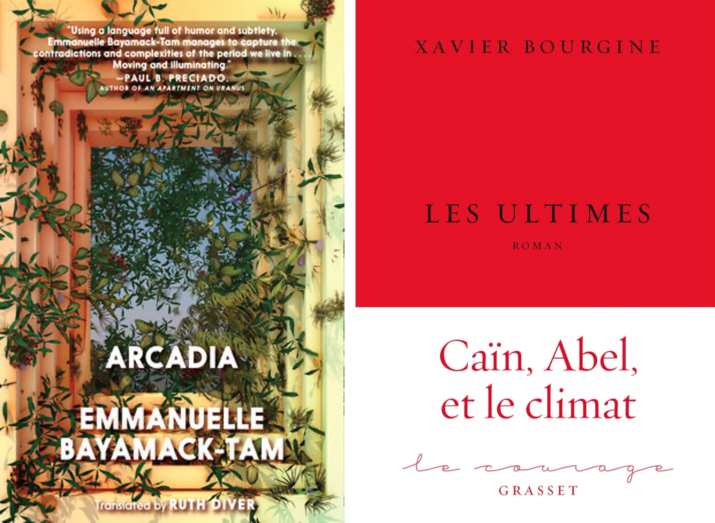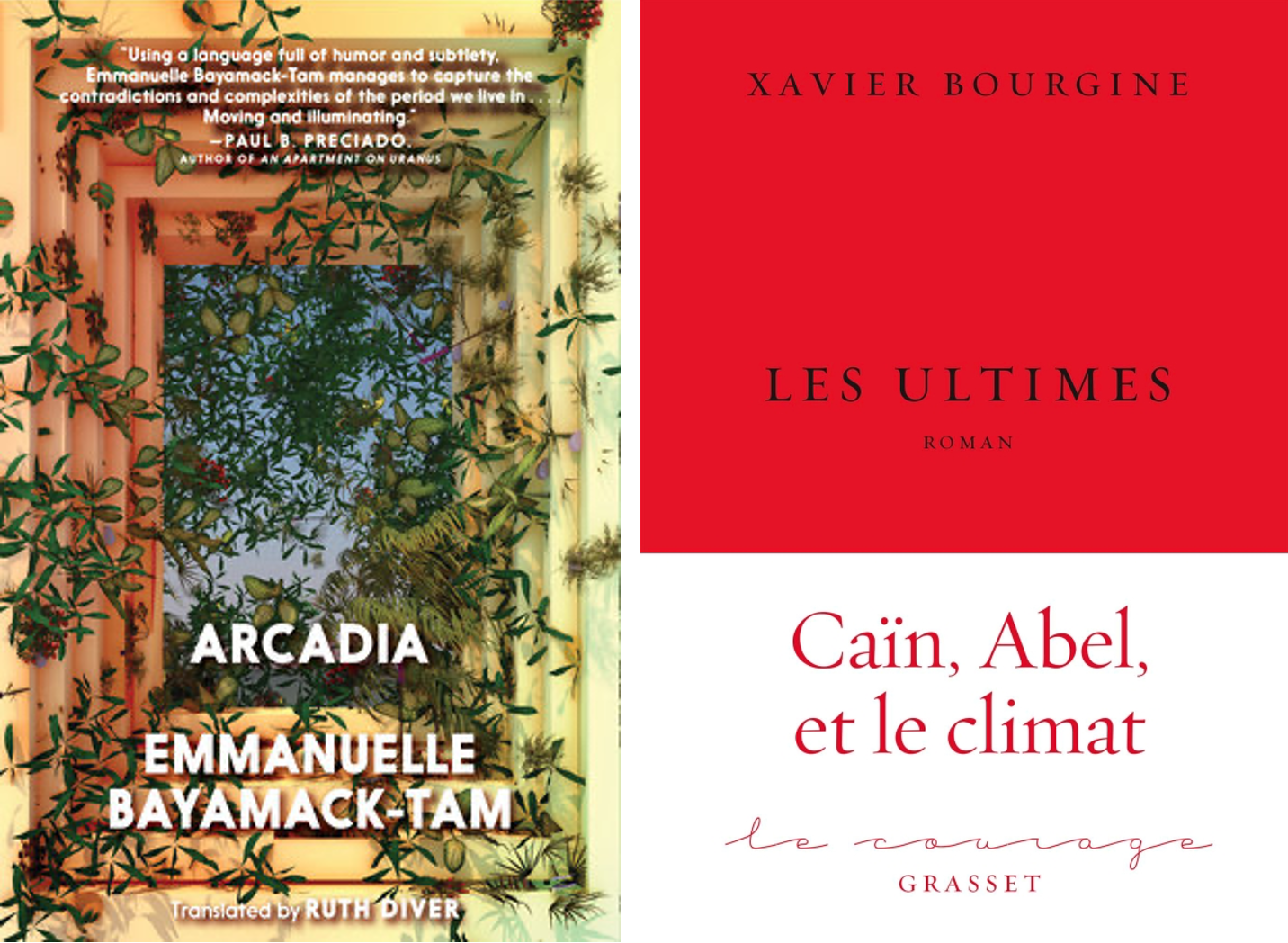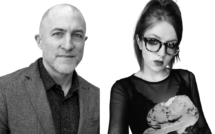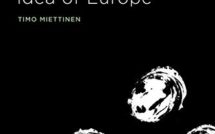

“I don’t believe in the Amish model. And I don’t believe that the Amish model can solve the challenges of contemporary environmentalism,” French President Emmanuel Macron said in September 2020, after major French political leaders protested the environmental costs of 5G[1]. Macron’s controversial allusion to the “Amish model” is likely a clumsy reference to branches of French environmentalism that advocate for the radical reduction of goods, energy consumption, and travel. Although these branches may seem “regressive,” as President Macron suggested, their growing popularity in France shows the degree to which French citizens are concerned that their government is not appropriately addressing the climate crisis. Another sign of this increasing concern can be found in French bookstores, where more and more books, not just nonfiction, reflect a sense of urgency and anxiety regarding environmental issues. Two recent novels illustrate this trend: Emmanuelle Bayamack-Tam’s novel Arcadia (May 25, 2021), translated by Ruth Diver from the original French entitled Arcadie (2018), which won the 2019 Livre Inter Prize, and Les Ultimes (2021), the debut novel of young author Xavier Bourgine, whose previous writing includes bylines in Le Monde.
Arcadia follows the coming of age of the narrator Farah, an odd-looking hunchbacked teenager who is surprised at puberty to discover—as her body grows more masculine and her period never arrives—that she is intersex. But Farah’s peculiar body does not stand out in her commune of “freaks” called “Liberty House” in the southeastern French countryside. After all, the phalanstery’s co-founder and spiritual leader Arcady preaches unconditional love and discourages the use of mirrors. Primarily, though, Liberty House’s aim is to gather people looking to live in harmony with nature and embrace an anti-speciesist and anti-technology lifestyle. Like survivalists, Liberty House members grow their own organic fruits and vegetables and stock up on food; unlike survivalists, they promote free love, an attitude that helps attract wealthy participants who can guarantee the economic survival of the community. But Farah soon discovers the limits of Arcady’s motto, “omnia vincit amor”—love conquers all, as Virgil wrote. When Arcady finds out an African migrant has been stealing from their Edenic orchard, Farah begins to question her community’s faithfulness to its own ideals. Just as she finds herself caught between male and female genders, she must choose between the ideals of Liberty House and those of the world outside.
Les Ultimes (loosely translated, The Last Ones) takes us to the oldest neighborhood in Paris, the fifth arrondissement. There, we dive into the lives of Corentin and Alban, two cerebral, privileged twin brothers who are university students at France’s prestigious Ecole Normale Supérieure. Corentin is a geoscientist and Alban studies philosophy. With the help of Edouard, their lover, they organize a series of interdisciplinary conferences entitled “Les Ultimes” (“The Last Ones”), built around the idea that their generation is “the first generation to know that they may be the last one”[2] (17). Although both agree that the climate crisis indicates societal collapse, they represent opposite attitudes. For Corentin, the perspective of imminent extinction means that everything is permitted. Alban instead feels that their generation should attempt to survive due to a moral responsibility to the generations to follow: it is not too late to “stop moving, stop air-conditioning, stop consuming”[3] (31). This conceptual divergence grows vivid as the twins move through the daily life of idle young bourgeois intellectuals. During a weekend in Barcelona, the twins find themselves at the anti-tourism demonstrations that took place in the summer of 2017 in part to denounce the environmental consequences of mass tourism[4]. This event triggers Alban, whose mood shifts with the realization that he and his brother are part of the problem: as Edouard would say later in the novel, “the climatic, economic, and political issue that [the twins] aimed to understand is actually coming from them, from the elite, its lifestyle, its pretention, both legitimate and hypocritical, to be the solution”[5] (203). After the Barcelona trip, Alban grows distant from his brother and starts questioning the ethical legitimacy of his travel plans—“if the glass of water that I drink makes half of a country thirsty, I must ask myself whether it is legitimate for me to drink it”[6] (112). The first half of the novel turns around the twins’ dialectic, spiraling downward.
Farah’s light, adolescent, humoristic tone in the beginning of Arcadia invites us to take environmentalism at Liberty House with a grain of salt: did the thirty members join this community because of their environmental convictions, or because of their inability to function in the outside world? To young Farah, Liberty House seems more like an asylum for dropouts, a place that “essentially welcomes the losers in life’s great beauty parade and removes them from the pitiless rigors of the social world” (22). Farah’s parents indeed seem particularly unfit to live in the “social world” and what it entails:
We were afraid of new technologies, global warming, electro-smog, parabens, sulfates, digital surveillance; prepackaged salad leaves, mercury levels in the oceans, gluten, aluminum salts, polluted aquifers, glyphosate, deforestation, milk products, bird flu, diesel fuel, pesticides, refined sugar, endocrine disruptors, arboviruses, smart electricity meters, and the rest (19).
Farah’s comical listing of her parents’ endless anxieties makes them look both pathological and ridiculous. Her quasi-satirical portraits of the other members of Liberty House confirm the readers’ skepticism toward this utopian project. In fact, we feel more complicity and sympathy toward Farah, who just wants to be a “normal” kid—wishing first for an iPhone, a retainer for her teeth, and a brace to straighten her back, and later for a uterus and breasts like the other girls. And our discomfort with Liberty House will grow as we realize with Farah that Angosom, the African migrant, is not welcome in this “asylum” of “unlimited” love.
As Farah grows up, however, she doesn’t reject her community’s idiosyncracies. By the end of the book, she takes on the narratives of apocalypse, last judgement, resurrection, and salvation that permeate her guru Arcady’s message:
Everything must disappear, except us, who never sought to harm anyone and were guilty of trifles that have nothing in common with the atrocities perpetrated in the outside world… (348-9).
Les Ultimes, too, draws on Christian axiology and eschatology. Far from the natural shamelessness of the nude commune, the urban bourgeois twins view the coming apocalypse with great anxiety. Alban constantly assesses the ethical weight of his actions and, as a result, oscillates between shame, guilt, and depression. On the contrary, Corentin embraces cynicism and anger, which will eventually cause his brother to share the fate of biblical Abel—and Corentin the fate of Cain. Whether it be on an intradiegetic or extradiegetic level, Arcadia and the first part of Les Ultimes play around the apocalyptic idea that the end of times is coming, that the righteous will be saved, and the wrongdoers punished. In so doing, they illustrate how certain trends of environmentalism have adopted a Christian emotional and imaginary paradigm.
In fact, the novels encourage us to interrogate the nature of certain environmentalist discourses and attitudes, especially when they tend to embrace a religious rhetoric and logic. True, Alban and the members of Liberty House suffer from deep eco-anxiety. But how different is this anxiety from the fear of the end times? And to what extent are some environmentalists simply adapting a millenarian tale to contemporary concerns? In a secular country like France, where more than half of people consider themselves as atheists or not religious[7], the spiritual practices of Liberty House and guru-like role of Arcady are also likely to raise some red flags: this “ecovillage” seems not so different from a sect after all. As a result, some readers might further question the authenticity of Arcady’s environmentalist message. In a way, these novels may help us understand why President Macron derided the “Amish model” in the first place. His wariness of certain trends of environmentalism may arise not only from their anti-technology or “regressive” approach, but also from their religious, quasi-sectarian tendencies.
Both books allow readers to perceive the intricacies of the environmental crisis using another lens: sexuality. In Les Ultimes, the asymmetrical relationship among the incestuous twins and their polyamorous partner Edouard emphasizes the power dynamics that structure society’s ideological conflicts. In their triangular relationship, Corentin stands as a “dominating, carnist, cisgender, white male,” (115) who condescends to his brother Alban and also to Edouard, whom he calls “impotent,” “powerless,” and “passive.” This alpha-male behavior, the reader is led to think, epitomizes the inconsistent attitude of the 1 percent who emit twice as much carbon dioxide as the poorer half of the world while castigating their contribution to overpopulation. Arcadia takes a less schematic approach to the problem of portraying power dynamics. Farah refuses to disavow the priestly Arcady’s moral system even as she questions how well he lives up to those beliefs. She thus defends her love for Arcady as anything but indoctrination or abuse.
Readers might wonder: why did both authors choose to depict urgent environmental matters alongside, or through, taboo relationships? To what extent are Bayamack-Tam and Bourgine inveighing on moral issues with which France is currently grappling, like those of incest and sexual consent?[9] Perhaps in Les Ultimes Bourgine aims to show how sexual and environmental “vices” cannot be put on the same plane: whereas Alban’s reluctance to interact with his brother, and the twins’ estrangement from their mother, could have indicated shame for their incest, instead Alban seems more ashamed of his brother’s consumptive lifestyle. In a way, shame is not where we expect it to be. Social and environmental inaction should be society’s real stigma.
Bayamack-Tam goes even further. As Farah comes to terms with her body, Arcadia explores the intersex protagonist as the messiah who can bring the best of Liberty House’s environmental and sexual ethics to the outside world. After tragedy strikes her community, Farah adopts its millenarian message that another world awaits us:
One way or another, we will be there to see the postcolonial and post-apocalyptic golden age Arcady promised. . . [we’ll] discover a world free of nuclear-power plants, industrial installations, road networks, fossil-fuel exploitation, and cell-phone towers . . . ionizing radiation, nanoparticles, dioxins, chlorinated cyclodienes, PCBs, radon, endocrine disruptors. . . (349).
Like Arcadia, Les Ultimes suggests that there is life after death. The second part of the book focuses on Violaine Vergès, the twin’s mother, through her own personal tragedy. Resilient and hopeful through her grief, Violaine takes on her sons’ conference project “Les Ultimes.” In the end, the twins were not the last ones. Interestingly, the previous generation has become a source of hope and salvation. Breaking with a linear temporality, the second part of Les Ultimes challenges the idea that the solution to the environmental crisis lies in the future, in youth and innovation. In fact, turning to older generations for intellectual and practical support—and taking, in doing so, a step “backward”—seems like an equally legitimate move toward environmental resilience and justice.
These novels may illustrate the power of that “Amish model” after all. Like 90 percent of the Amish teenagers who go back to their community after their rumspringa, a rite of passage during which they go explore the outside world, Farah returns to embrace Arcady’s messages after experiencing life in the “social world.” A contemporary parable, Les Ultimes shows us that Corentin’s “business as usual” approach as well as his dismissiveness towards his brother’s opinions are aporetic. The biblical allusion to Cain and Abel reinforces the book’s allegorical message as Corentin shows himself willing to do anything to avoid facing his own wrongdoing. Sacrificing his brother Alban, whose “punitive environmentalism” he mocks, leads Corentin to his own tragic outcome. Even though they encourage us to keep a critical eye on certain environmentalist rhetorics, both Les Ultimes and Arcadia also give us a warning: it may not be the so-called “Amish model,” but rather the Macronian one, that leads to despair and destruction.
Chloé Vettier is finishing her PhD in French Literature at Princeton University (USA) and Sorbonne Université (France). Her dissertation, entitled “Writing out Shame: From Augustine to Genet,” examines shame as an emblematic motif of the writing of the self. She is originally from France.
Arcadia
Emmanuelle Bayamack-Tam, trans. Ruth Diver
Seven Stories Press
Hardcover / 368 Pages / 2021
ISBN 9781644210536
Les Ultimes
Xavier Bourgine
Editions Grasset
Hardcover / 224 pages / 2021
EAN 9782246823315
References
[1] “France’s Macron backs 5G technology over ‘the Amish model’.” France 24. 15 September 2020, https://www.france24.com/en/20200915-france-s-macron-backs-5g-technology-over-going-back-to-the-oil-lamp. Accessed 7 May 2021.
[2] All translations are my own. “la première génération à savoir qu’elle sera peut-être la dernière.”
[3] “Cesser de bouger, cesser de climatiser, cesser de consommer.”
[4] “Anti-tourist demos spread from Barcelona to Mallorca.” Euronew, 4 August 2017, https://www.euronews.com/2017/08/04/spain-anti-tourist-demonstrations-spread-from-barcelona-to-mallorca. Accessed 7 May 2021.
[5] “le problème qu’ils désiraient comprendre, climatique, économique, politique, vient d’eux-mêmes, de l’élite, de son mode de vie, de sa prétention, en partie légitime, en partie hypocrite, à en être la solution.”
[6] “si le verre d’eau que je bois assoiffe la moitié d’un pays, je dois me demander s’il est légitime que je le boive.”
[7] Rick Noack. “Map: These are the world’s least religious countries.” The Washington Post, 14 April 2015, https://www.washingtonpost.com/news/worldviews/wp/2015/04/14/map-these-are-the-worlds-least-religious-countries/. Accessed 7 May 2021.
[8] “toi, comme tous ces autres males blancs, cisgenres, carnistes, dominateurs.”
[9] Roger Cohen. “Shedding Shame and Silence in France.” The New York Times, 29 January 2021, www.nytimes.com/2021/01/29/world/europe/kouchner-duhamel-incest.html. Accessed 7 May 2021 ; “French parliament approves landmark bill setting age of sexual consent at 15.” France 24, 15 April 2021,
www.france24.com/en/france/20210415-french-parliament-approves-landmark-bill-setting-age-of-sexual-consent-at-15. Accessed 7 May 2021.




